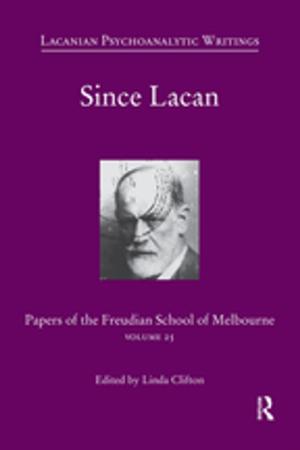Romanticism, Hermeneutics and the Crisis of the Human Sciences
Fiction & Literature, Literary Theory & Criticism| Author: | Scott Masson | ISBN: | 9781351149785 |
| Publisher: | Taylor and Francis | Publication: | November 28, 2017 |
| Imprint: | Routledge | Language: | English |
| Author: | Scott Masson |
| ISBN: | 9781351149785 |
| Publisher: | Taylor and Francis |
| Publication: | November 28, 2017 |
| Imprint: | Routledge |
| Language: | English |
The human sciences established and developed in the nineteenth century have slowly disintegrated. It is an ironic end. It was in the name of the greater legitimacy of more universal psychological criteria that its architects disavowed the traditional theological standard for valuing and evaluating human words and deeds. With hindsight, we can see that universality was indeed gained, but only at the cost of alienating any sense of common legitimacy. Harold Bloom, defending the canon largely in the humanising, 'moral sense' convention of critics operating since Matthew Arnold, has resolutely maintained the common legitimacy of aesthetic value against the claims of particular interest groups. But the very universality attached to aesthetic value is at odds with the world of common sense, and thus lies at the root of the problem. To complicate matters, this universality has been understood as a traditional criterion. A more radical treatment of the subject is needed. This study begins by surveying the field of modern hermeneutics. Noting its repeated crises of self-legitimisation, it traces these to circular beliefs bequeathed by Romanticism that human nature is self-begetting, and can thus be known intimately and autonomously. After providing a historical overview of how human nature had been understood, the focus shifts to the attack in Coleridge's Biographia Literaria on Wordsworth's 1802 Preface to Lyrical Ballads, and to a reading of some key Romantic texts. It reads Coleridge's famous definition of the imagination as an attack on Romantic hermeneutics, rooted in the traditional view that man has been created in Imago Dei.
The human sciences established and developed in the nineteenth century have slowly disintegrated. It is an ironic end. It was in the name of the greater legitimacy of more universal psychological criteria that its architects disavowed the traditional theological standard for valuing and evaluating human words and deeds. With hindsight, we can see that universality was indeed gained, but only at the cost of alienating any sense of common legitimacy. Harold Bloom, defending the canon largely in the humanising, 'moral sense' convention of critics operating since Matthew Arnold, has resolutely maintained the common legitimacy of aesthetic value against the claims of particular interest groups. But the very universality attached to aesthetic value is at odds with the world of common sense, and thus lies at the root of the problem. To complicate matters, this universality has been understood as a traditional criterion. A more radical treatment of the subject is needed. This study begins by surveying the field of modern hermeneutics. Noting its repeated crises of self-legitimisation, it traces these to circular beliefs bequeathed by Romanticism that human nature is self-begetting, and can thus be known intimately and autonomously. After providing a historical overview of how human nature had been understood, the focus shifts to the attack in Coleridge's Biographia Literaria on Wordsworth's 1802 Preface to Lyrical Ballads, and to a reading of some key Romantic texts. It reads Coleridge's famous definition of the imagination as an attack on Romantic hermeneutics, rooted in the traditional view that man has been created in Imago Dei.















